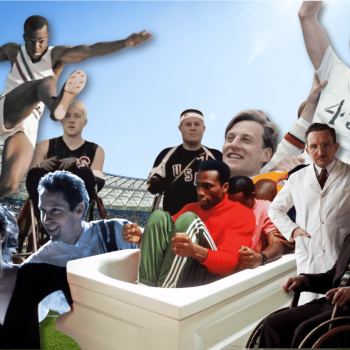As I've been talking to churches and universities about Faithful Citizenship this year, most people agree it would be lovely if we could treat each other with more compassion and patience, if we could make our own needs less paramount. But one of the questions I most often get has to do with the practical aspects. What does this actually look like? How would a life lived in love and seeking reconciliation with those who differ from us be shaped?
In the book, I suggested some models, people like Sojourner Truth, William Gladstone, and Abraham Lincoln. But I've found a powerful contemporary example in the life and death of Dan Terry, as described in the new book Making Friends among the Taliban by Jonathan Larson. In all our talk about what would make it possible for us to speak across the great cultural divides between us, love has been central, and I was deeply moved to learn that engraved on Dan Terry's headstone is, simply, this: "Above all, clothe yourself in love."
Dan Terry was the son of Methodist missionaries who lived much of his life in the foothills of the Himalayas. He spent three decades working as a peacemaker in Afghanistan, gathering over tea in plazas and in huts with people of all sorts and conditions, seeking ways to bring people in that always-divided area together although he was, at least in terms of his American citizenship, the most outside of outsiders. Although he was among people who were suspicious of his country and his faith, Dan managed to change their minds about him—and managed to love them, no matter who they might be. They called him "Pagal"—"crazy"—and maybe he was. But as Dr. King used to ask, What will you be an extremist for? As with Dr. King, Dan Terry sought to be an extremist for love.
Shaped as he was by regional stories of Gandhi, and by his memories of the young Dalai Lama, who actually visited his classroom as a young student, Terry lived out his Christian faith in the midst of Afghan Muslims—and did so in a way that respected their faith, their customs, and their humanity. He spent time in a Talibani prison, he fed the starving, he brought together those who were feuding. Although he was eventually killed in 2010 by armed extremists, the local Taliban openly disavowed any responsibility for his murder, calling it a vile crime and seeking the responsible parties. At his funeral, the people of the country gathered to mourn the man who had given his life—his entire life—for them and for their country, even though many think of Americans and Afghans—especially Americans and the Taliban—as enemies.
Jacoc Baynham wrote in Salon that Dan Terry's work made a difference:
He had done development work all across the country—often traveling by bicycle. His was the sort of low-budget, small-scale development work that achieves lasting results. Instead of imposing Western solutions to problems, he worked with villages to solve their problems in a sustainable way. If a village needed electricity, he would find the money to buy a small turbine for a micro-hydroelectric project. He didn't talk much about his successes, nor about his scrapes with death. He took a bullet in his knee during the Soviet era, and though it still caused him great pain, he never mentioned it, and it didn't inhibit his work.
For the past six months, I've been arguing that Christians ought to be seeking reconciliation, not victory in some ill-conceived culture wars. Dan Terry lived his life in Afghanistan as just such an agent of reconciliation. Larson describes him as a rahnama, that is, a guide or go-between "who gently nudges travelers on their way through uncharted terrain toward a more peaceable country." (33) In that Taliban prison, he made connections for a lifetime; for years afterward in Kabul, Larson reports, people would ask if Dan was at his place of employment, remembering, "He befriended us in prison." (47)
During one winter when isolated tribal people in the mountains were starving, Dan mobilized even their enemies to help open roads that had never been driven before in winter and bring them food. He gathered resources, trucks, food, workers. He organized them, and gave them a moral purpose. As one worker said, he shamed them into this moral adventure by being "more Muslim than the Muslims." (55)





